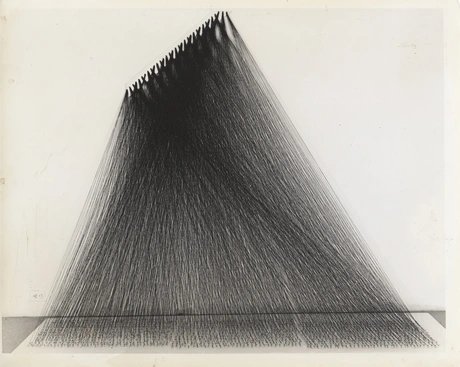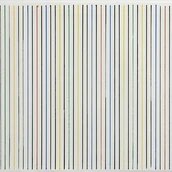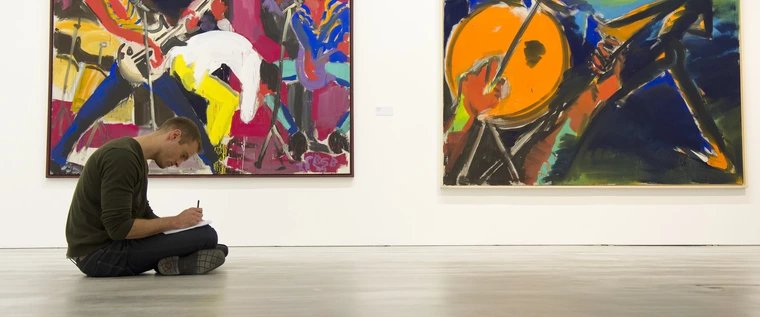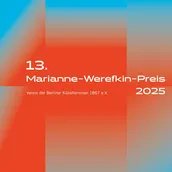
More than most art, my string pieces are vulnerable to time. They are absolutely temporal. – Kazuko Miyamoto
The exhibition is the first institutional solo presentation devoted to the Japanese-American artist Kazuko Miyamoto (b. 1942, JP) in Germany, a leading figure in the post-minimal and feminist movements in New York, where she has lived since 1964.
Spread across the first, second, and third floors of KW, as well as its courtyard, String Constructions focuses on Miyamoto’s eponymous sculpture series from the 1970s and 1980s, and traces the shifts in her methodology. The seminal String Constructions, two- and three-dimensional waves of string are borrowed works, but their intricate construction of repeatable but unique gestures—marking, nailing, knotting, and rigorously tethering hundreds of strings—is produced onsite by the KW team and will be cut when the exhibition ends. Her sculptural constructions, therefore, interweave the notion of collectivity, liveness, sustainability, as well as the ephemeral or temporary into their conceptual framework.
This line of inquiry follows KW’s Director, Emma Enderby’s vision for focusing on collectiveness, sustainability, and local production, while similarly continuing KW’s institutional legacy, revisiting artists that sit outside of the canon.
Miyamoto’s sculptures, made of string, nails, and drawn lines, along with her spatial installations within the institution’s factory building, tap into her interest in the body’s relationship to urban, socio-economic, and functional architectures.
These works cut through the space with an immersive yet transient quality. The show presents her unique performative sensibilities towards the body’s relationship to space, material, and the politics of labor and display.
During the 1970s and 1980s, Kazuko Miyamoto developed many of her works as part of co-organizing A.I.R. Gallery in New York’s SoHo district—the first non-profit space led by and dedicated to exclusively female artists in New York. In her own gallery space on the Lower East Side, onetwentyeight, she likewise has continued to promote feminist and collective practices today. The exhibition’s public program will highlight the role of collaboration, performance, and feminism in Miyamoto’s work and the city of Berlin.
As part of a seminar in cooperation with the Berlin University of the Arts – UdK Berlin, a group of students will collectively and site-specifically reconstruct a work by the artist—wood and rope bridges, originally installed at Bryant Park in 1982 —which will be on view in KW’s courtyard for the duration of the exhibition.
A publication featuring new conversations and statements by and with friends, family, fellow artists, and collaborators will be published in collaboration with Verlag der Buchhandlung Walther und Franz König.
- Curator: Emma Enderby, Sofie Krogh Christensen
- Assistant Curator: Lara Scherrieble
Kazuko Miyamoto was born in Tokyo in 1942, where she studied at the Gendai Bijutsu Kenkyujo (Contemporary Art Research Studio). She moved to New York in 1964 and attended the Art Students League of New York (1964–1968). In 1968, she began working with Sol LeWitt, assisting him with his sculptures and wall drawings. Miyamoto held her first solo exhibitions in New York and Bari in 1973. From 1974 to 1983, she was a member of A.I.R. Gallery in New York, where she exhibited regularly and co-curated exhibitions including Dialectics of Isolation (1980). She also participated in significant group exhibitions such as 13 Women Artists—alongside Louise Bourgeois, Loretta Dunkelman, Pat Lasch, Patsy Norvell, and Joyce Robins, members of the Women’s Ad Hoc Committee—at 117–119 Prince Street (1972).
In 1986, she founded Gallery Onetwentyeight in New York as a platform for BIPOC and diaspora artist communities. Solo exhibitions include Kazuko Miyamoto at Belvedere 21, Vienna (2024); Museo d’Arte Contemporanea Donnaregina, Naples (2023); Japan Society, New York (2022); A.I.R. Gallery, New York (2017); Circuit, Lausanne (2015); Japan Foundation, New Delhi (2015); and Kunsthalle Krems, Austria (2008).
- Support by Hauptstadtkulturfonds
- Additional support by Henry Moore Foundation
- Thanks to EXILE Gallery, Galleria Alessandra Bonomo, Take Ninagawa and Zürcher Gallery
Additional information
Regular opening hours
Price info: Berlin Welcome Card holders 6,00 €
The purchase of tickets is only possible on site and by card payment.
Price: €10.00
Reduced price: €6.00
Reduced price info: Berlin Welcome Card holders 4,50 €
Free admission to visitors up to and including 18, Friends of KW and Berlin Biennale, and KW Lover* cardholders, Berechtigungsnachweis holders (former berlinpass), Recipients of ALG II, students of Weißensee Kunsthochschule Berlin and Universität der Künste Berlin, ICOM Members and Museumsbund Members
- Wed-Mon 11 a.m.–7 p.m.
- Tues closed
Price info: Berlin Welcome Card holders 6,00 €
The purchase of tickets is only possible on site and by card payment.
Price: €10.00
Reduced price: €6.00
Reduced price info: Berlin Welcome Card holders 4,50 €
Free admission to visitors up to and including 18, Friends of KW and Berlin Biennale, and KW Lover* cardholders, Berechtigungsnachweis holders (former berlinpass), Recipients of ALG II, students of Weißensee Kunsthochschule Berlin and Universität der Künste Berlin, ICOM Members and Museumsbund Members
Dates
January 2026
| Mo | Tu | We | Th | Fr | Sa | Su |
|---|---|---|---|---|---|---|
1
|
2
|
3
|
4
| |||
5
|
6
|
7
|
8
|
9
|
10
|
11
|
12
|
13
|
14
|
15
|
16
|
17
|
18
|
19
|
20
|
21
|
22
|
23
|
24
|
25
|
26
|
27
|
28
|
29
|
30
|
31
|



